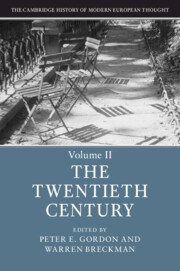Book contents
- The Cambridge History of Modern European Thought
- The Cambridge History of Modern European Thought
- The Cambridge History of Modern European Thought
- Copyright page
- Contents
- Contributors
- Preface
- Introduction
- 1 Sociology and the Heroism of Modern Life
- 2 Psychoanalysis: Freud and Beyond
- 3 Modern Physics: From Crisis to Crisis
- 4 Varieties of Phenomenology
- 5 Existentialism and the Meanings of Transcendence
- 6 Philosophies of Life
- 7 The Many Faces of Analytic Philosophy
- 8 American Ideas in the European Imagination
- 9 Revolution from the Right: Against Equality
- 10 Western Marxism: Revolutions in Theory
- 11 Anti-imperialism and Interregnum
- 12 Late Modern Feminist Subversions: Sex, Subjectivity, and Embodiment
- 13 Modernist Theologies: The Many Paths between God and World
- 14 Modern Economic Thought and the “Good Society”
- 15 Conservatism and Its Discontents
- 16 Modernity and the Specter of Totalitarianism
- 17 Decolonization Terminable and Interminable
- 18 Structuralism and the Return of the Symbolic
- 19 Post-structuralism: From Deconstruction to the Genealogy of Power
- 20 Contesting the Public Sphere: Within and against Critical Theory
- 21 Restructuring Democracy and the Idea of Europe
- Index
13 - Modernist Theologies: The Many Paths between God and World
Published online by Cambridge University Press: 19 August 2019
- The Cambridge History of Modern European Thought
- The Cambridge History of Modern European Thought
- The Cambridge History of Modern European Thought
- Copyright page
- Contents
- Contributors
- Preface
- Introduction
- 1 Sociology and the Heroism of Modern Life
- 2 Psychoanalysis: Freud and Beyond
- 3 Modern Physics: From Crisis to Crisis
- 4 Varieties of Phenomenology
- 5 Existentialism and the Meanings of Transcendence
- 6 Philosophies of Life
- 7 The Many Faces of Analytic Philosophy
- 8 American Ideas in the European Imagination
- 9 Revolution from the Right: Against Equality
- 10 Western Marxism: Revolutions in Theory
- 11 Anti-imperialism and Interregnum
- 12 Late Modern Feminist Subversions: Sex, Subjectivity, and Embodiment
- 13 Modernist Theologies: The Many Paths between God and World
- 14 Modern Economic Thought and the “Good Society”
- 15 Conservatism and Its Discontents
- 16 Modernity and the Specter of Totalitarianism
- 17 Decolonization Terminable and Interminable
- 18 Structuralism and the Return of the Symbolic
- 19 Post-structuralism: From Deconstruction to the Genealogy of Power
- 20 Contesting the Public Sphere: Within and against Critical Theory
- 21 Restructuring Democracy and the Idea of Europe
- Index
Summary
On November 7, 1917 Max Weber offered his comments on “Science as a Vocation” before an assembly of students and faculty at the University of Munich, declaring that “disenchantment” was an “inescapable condition” and “the fate of our times.” But history tells us that nothing is truly inevitable. Although modern European intellectual history is replete with narratives of disenchantment and religious decline, the fact remains that religious speculation and formal discourses of theology survived well through the end of the twentieth century. For intellectuals who have shed the last remnants of personal faith, the endurance of theology in late modernity may seem perplexing, a symptom of what Nietzsche called Unzeitgemäßigkeit, or a decalibration in time. Already in 1882 Nietzsche’s madman declared that “God is dead. God remains dead. And we have killed him.” But even the madman recognized that he had come “too early.” What he called the “tremendous event” of God’s death was “still on its way”; it had “not yet reached the ears of men.” Critics who harken to the madman’s prophesy may likewise insist that European religious thought is a remnant of an earlier and more pious age.
- Type
- Chapter
- Information
- The Cambridge History of Modern European Thought , pp. 336 - 360Publisher: Cambridge University PressPrint publication year: 2019



